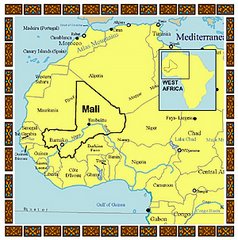

I swore in this morning as a Peace Corps Volunteer. There were 76 of us, outfitted to the nines in Malian attire at the United States Embassy. I was swimming in my own sweat in the 96 degree heat, but I still got goosebumps as I raised my right hand and swore to uphold and defend the Constitution of the United States against all enemies, foreign or domestic. It was a strange moment, 76 voices in unison, all wondering what exactly we were swearing to do, but understanding that the moment was symbolic and represented a pretty huge commitment. Two years of my life consecrated to serving a group of people and a country, to better their lives and hopefully, mine as well.










 And this is the main hangout of my village - my host dad's bike repair station/ butiki on the side of the road. I will spend a lot of time here in the months... er, years to come trying to understand Senufo and drinking tea.
And this is the main hangout of my village - my host dad's bike repair station/ butiki on the side of the road. I will spend a lot of time here in the months... er, years to come trying to understand Senufo and drinking tea.

